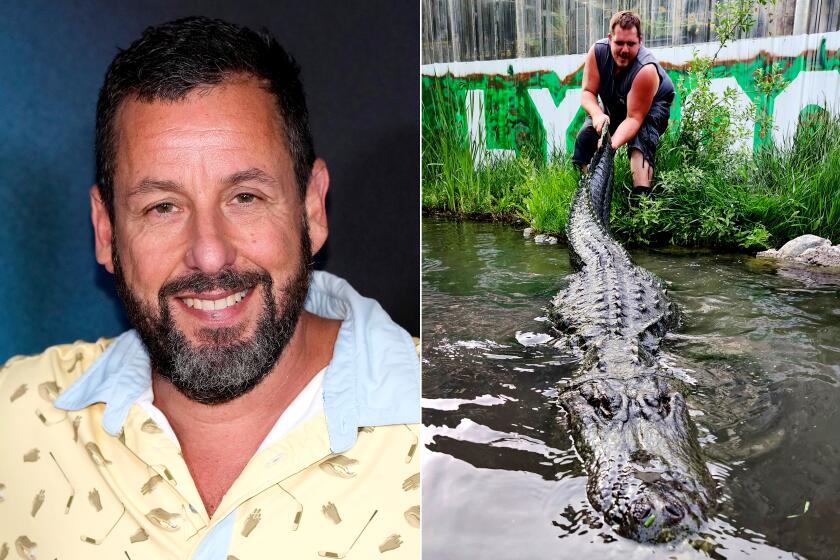A Supreme Showdown
- Share via
Eight years ago the nation was mesmerized and polarized during the Senate hearings to confirm conservative African American Clarence Thomas as the 106th Justice of the Supreme Court.
Following the bombshell testimony about sexual harassment from his former employee, Anita Hill, Thomas ended up winning confirmation in the Senate with a 52 to 48 vote--the narrowest margin ever for a Supreme Court nominee. The hearings also opened the debate on the complexities of both racial and sexual ideologies.
But don’t look for any conclusions as to who was really telling the truth in “Strange Justice,” Showtime’s docudrama on Thomas’ confirmation.
The movie, which premieres Sunday on the cable network, focuses more on how both Thomas and Hill, who is now a university law professor, were manipulated by the Washington, D.C. spin doctors.
“They were two people who were thrown into the middle of the maelstrom,” says director Ernest Dickerson (“Blind Faith”).
“One learned to swim and the other one didn’t.”
Adapted by Jacob Epstein from the book “Strange Justice” by Jane Mayer and Jill Abramson, the film stars Delroy Lindo (“Malcolm X”) as Thomas, Regina Taylor (“I’ll Fly Away”) as Hill and Mandy Pantinkin as the Republican’s spin-meister Kenneth Duberstein.
Lindo was thrilled the film was not about whether Thomas was the aggressor and Hill his victim
“People come to this story because it is such recent history with fairly strong and well-formed opinions, so why make a movie about that?” he says. “The reality is much more interesting. What I kept hearing from Ernest was that the thrust of the film had to do with how both parties were manipulated.”
Besides, Lindo adds: “I really didn’t relish the idea of taking on a part of which there was no payoff. There was no upside. Why do that?”
Lindo, who is both taller and thinner than Thomas, studied footage of the Supreme Court justice in order to get his demeanor physically and psychologically.
Much of it was new to him because the actor had paid little attention to the hearings back in October, 1991. He did, though, tune in to watch Thomas’ impassioned prime-time rebuttal to Hill’s accusations in which he likened the proceedings to a lynching.
That speech, Lindo says, got to him. “It made me sympathize with him in that moment,” he explains. “But up to that point I had not watched a lot of the hearings and I didn’t have strong feelings one way or another. Based on what little attention I paid and what little knowledge I had of Judge Thomas, it did seem at best he was a questionable choice for the Supreme Court.”
Taylor, though, strongly believed that every word Hill said during her testimony was true. In fact, she adds, the whole manipulation aspect of the script didn’t interest her. “I wanted to focus in on the heart and spirit of the character,” she explains.
Hill, she says, believed she needed to do what she felt was right. “She came out and spoke against all odds,” Taylor says. “She made a stand in terms of what she felt was right. I think there is a pure spirit working there.”
Dickerson says that at the outset, Thomas went with his advisors and spin doctors in order to get confirmed. “He wasn’t well versed in constitutional law,” Dickerson points out. “There were a lot of reasons why he wasn’t an ideal candidate, so they were going to whip him into shape and make him one.”
However, he finally disregarded their advice. “It was obvious that what Duberstein wanted him to do wasn’t working for him--that all along he was being coached and asked to take positions he didn’t support in the name of politics,” says Dickerson. “But when they asked him to do a prepared statement in response to her charges, he wanted to fight his own way.”
Thomas, adds screenwriter Epstein, was a “flinty, argumentative and quite intelligent” individual. “I think he hid his true nature in the early parts of this process and when the torpedo of Anita Hill hit, all of a sudden he had to rely on himself. He could not really rely on the strategies with his handlers.”
Dickerson wanted Lindo to play Thomas with the total conviction of a man who was telling the truth. “When you look at those hearings, he obviously believed everything that he said,” says the director. “Whether or not he was in total denial, he is as totally convincing as she was.”
Though Thomas never talked to the authors of “Strange Justice,” Epstein says reports confirm that he had a terrible time and suffered during the proceedings. In one scene in the movie, his wife finds him having something akin to a nervous breakdown on the bathroom floor.
Epstein likens Hill’s experience in Washington as an “Alice in Wonderland”-type nightmare. “She just stepped in this and went down the rabbit hole and was tarred and feathered,” he says.
“Strange Justice’ airs Sunday at 8 p.m. on Showtime. The network has rated TV-14 (may be unsuitable for children younger than 14).
More to Read
Only good movies
Get the Indie Focus newsletter, Mark Olsen's weekly guide to the world of cinema.
You may occasionally receive promotional content from the Los Angeles Times.










